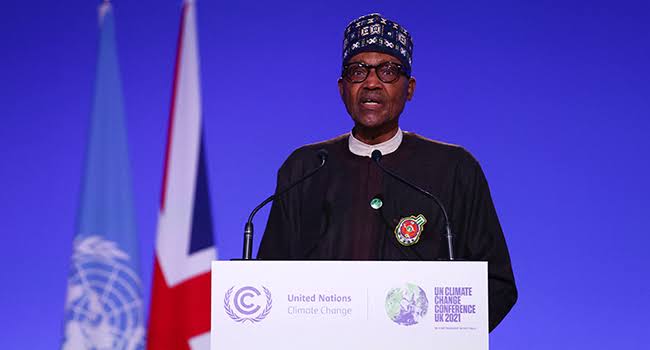President Muhammadu Buhari on Tuesday said 1.5 trillion dollars is the cumulative estimated amount needed by Nigeria over a ten-year period, to achieve an appreciable level of the National Infrastructure Stock.
This is as he assured them that Nigeria is ready for investment from developed economies.
President Buhari gave the figure in Glasgow at a COP 26 high-level side event on improving global infrastructure hosted by President Joe Biden of the United States, EU Commission President, Von Der Leyen, and the UK Prime Minister, Boris Johnson.
A statement issued by the Senior Special Assistant to the President on Media and Publicity, Mallam Garba Shehu quoted the President to have said, ‘‘Nigeria is ready for your investments in infrastructural development in the country.
‘‘My administration has established a clear legal and regulatory framework for private financing of infrastructure to establish a standard process, especially on the monitoring and evaluation process.
‘‘We look forward to working with you in this regard,’’ he told world leaders at the high-level meeting on the margins of the climate change conference.
The President also declared that his administration had taken infrastructure expansion in Nigeria seriously, conscious of the fact that new investments in critical sectors of the economy would aid lifting 100 million Nigerians from poverty by 2030.
‘‘There is a nexus between infrastructural development and the overall economic development of a nation. My administration identified this early enough as a major enabler of sustainable economic development and the realisation of other continental and global development aspirations particularly the 2030 Agenda for Sustainable Development Goals.
‘‘On my assumption of office in 2015, Nigeria faced a huge infrastructure deficit and the total National Infrastructure Stock was estimated at 35 per cent of our Gross Domestic Product,” he said.
He explained that in solving these problems, his administration embarked on a massive infrastructure expansion programme in the areas of Health care, education, transportation, manufacturing, energy, housing, agriculture, and water resources.
‘‘We provided more financial resources for these policies, charted new international partnerships and pursued liberalisation policies to allow private sector participation.
“We introduced the revised National Integrated Infrastructure Master Plan – a policy document that ensures our infrastructure expansion projects is cross-sectorally integrated and environmentally friendly,’’ he said.
The President welcomed the G7 countries for its plan to mobilise hundreds of billions of dollars of infrastructure investment for low-and middle-income countries.





